Hiring a content strategist is often a game-changer for businesses looking to improve their brand visibility and engagement. Companies frequently misunderstand the purpose and scope of this role, mistakenly expecting content strategists to focus only on content creation. In reality, a skilled content strategist is responsible for planning, developing, and managing content strategies that align with business goals. This role requires a blend of analytical, creative, and strategic skills, which makes it challenging to fill correctly.
In this article, we break down the process of hiring a content strategist. We discuss the essential qualifications, explore platforms for finding candidates, and provide guidance on writing effective job descriptions. To further support your recruitment efforts, check out our detailed content strategist interview questions.
Table of contents
Why Hire a Content Strategist?
A content strategist can solve numerous content-related challenges your business may be facing. For instance, if your website traffic is stagnant or your social media engagement is low, a content strategist can develop a plan to boost these metrics.
Consider hiring a content strategist if you need to:
- Align your content with business goals
- Create a consistent brand voice across platforms
- Improve content performance and ROI
If you're unsure about committing to a full-time hire, start with a short-term project or consultant. This allows you to assess the impact before bringing someone on board permanently. As your content needs grow, you can then transition to a full-time content strategist to drive your content initiatives forward.
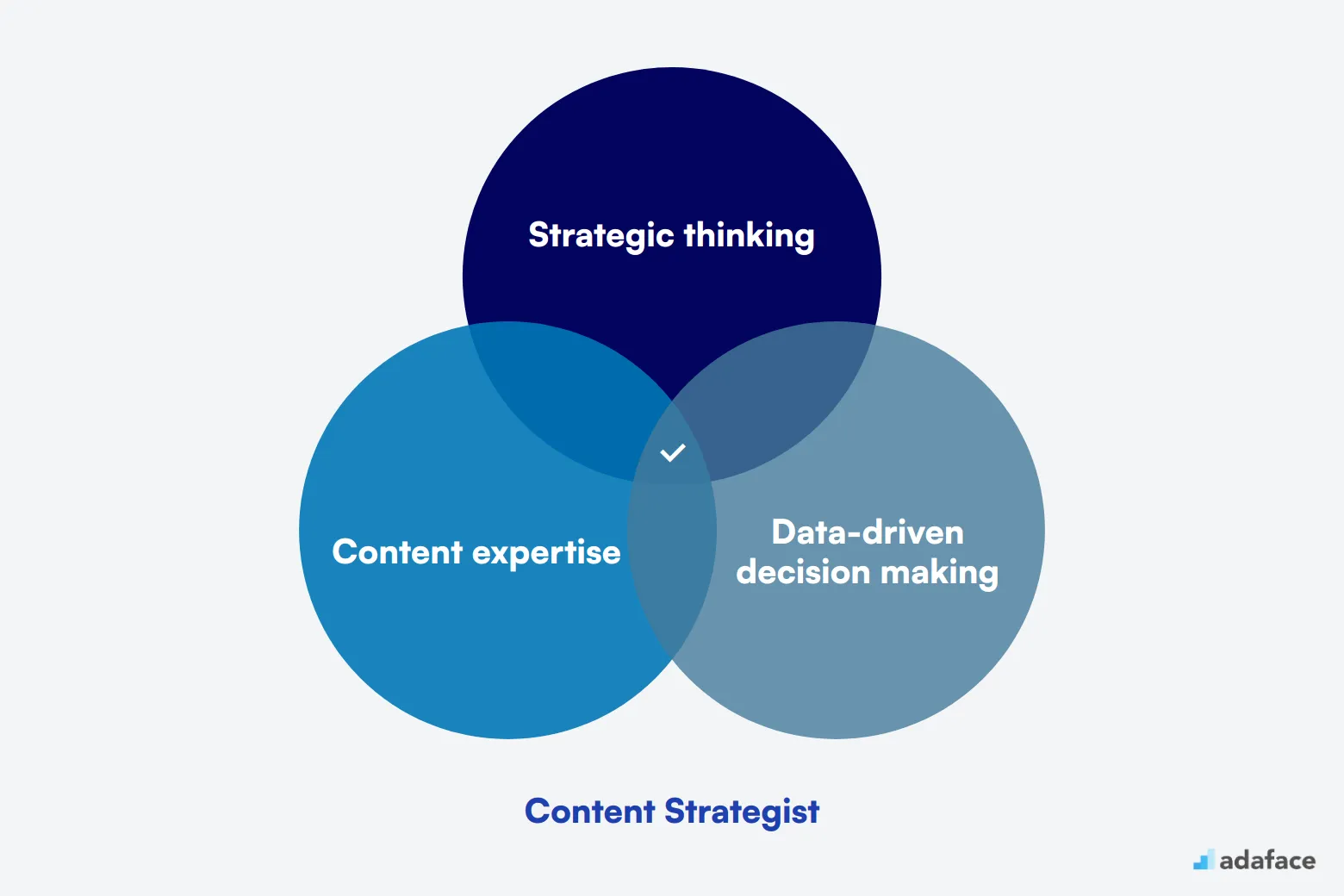
Content Strategist Hiring Process
The hiring process for a Content Strategist typically takes about 1-2 months. Here's a quick overview of the timeline and steps involved:
- Create and post a detailed job description
- Review resumes (expect responses within 3-4 days)
- Conduct skill assessments or case studies (about 1 week)
- Interview shortlisted candidates
- Make an offer to the best candidate
Each step requires careful consideration to ensure you find the right fit for your team. In the following sections, we'll dive deeper into these steps, providing checklists and materials to help streamline your hiring process.
Skills and qualifications to look for in a Content Strategist
When hiring a Content Strategist, it's important to distinguish between must-have skills and nice-to-have qualities. The ideal candidate profile can vary based on your company's specific needs and industry focus. Here's a quick guide to help you identify the key skills and qualifications for a Content Strategist role.
Required skills typically include strong writing and editing abilities, SEO knowledge, and experience with content management systems. Preferred qualifications might encompass data analytics expertise, UX/UI understanding, and project management skills. To assess these competencies effectively, consider using skills assessment tools tailored for content-related roles.
Remember, a great Content Strategist should excel in both creative and analytical aspects of the job. They should be able to craft compelling narratives while also understanding the data-driven side of content performance. Balance these factors when evaluating candidates to find the best fit for your team.
| Required skills and qualifications | Preferred skills and qualifications |
|---|---|
| Bachelor's degree in Marketing, Communications, or related field | Master's degree in Marketing or Communications |
| 3+ years of experience in content strategy or content marketing | Experience with data analytics and content performance metrics |
| Excellent writing and editing skills | Familiarity with UX/UI principles |
| Proficiency in SEO best practices | Knowledge of HTML and CSS |
| Experience with content management systems (CMS) | Project management experience |
How to Write an Effective Content Strategist Job Description
Once you've outlined the ideal candidate profile, it's time to craft a compelling job description to attract top-tier content strategists. A well-written JD is your first step in connecting with the right talent.
Here are some key tips to create an impactful content strategist job description:
• Highlight core responsibilities: Clearly outline the role's main duties, such as developing content strategies, analyzing metrics, and managing content calendars. Emphasize how the strategist will drive the company's content vision.
• Balance technical and soft skills: While expertise in SEO, content management systems, and analytics tools is crucial, don't forget to mention important soft skills like creativity, communication, and leadership.
• Showcase growth opportunities: Highlight potential for professional development, exciting projects, and the chance to shape the company's content direction. This can set your role apart and attract ambitious candidates.
• Be specific about requirements: Clearly state required qualifications, including years of experience, relevant certifications, and any industry-specific knowledge needed for the role.
10 Platforms to Hire Content Strategists
Once you've crafted a compelling job description for a content strategist, it's time to post it on the right job listing platforms to attract qualified candidates. Choosing the right platform is key to finding candidates who match your specific needs, whether you're looking for full-time, freelance, or remote roles.
Ideal for finding full-time content strategists due to its professional network and detailed profiles.

Indeed
Great for listing full-time positions with its extensive reach and robust job search features.

Upwork
Perfect for hiring freelance content strategists thanks to its large pool of freelance talent.

The remaining platforms can be tailored to various hiring needs: FlexJobs and Remote.co are excellent for remote roles, focusing on flexible work arrangements. Glassdoor offers insights into company reviews and salary data, making it useful for full-time hires. AngelList caters to startup environments, connecting you with candidates eager for that setting. For tech-related content strategy roles, look to Built In, which targets candidates interested in tech companies. To explore more about managing these roles efficiently, consider using an online assessment platform to streamline your recruitment process.
How to screen Content Strategist resumes?
Screening resumes is an important step in the hiring process, especially for roles like Content Strategist where the demand is high. It helps filter out candidates who don't meet the basic requirements, allowing you to focus on qualified individuals.
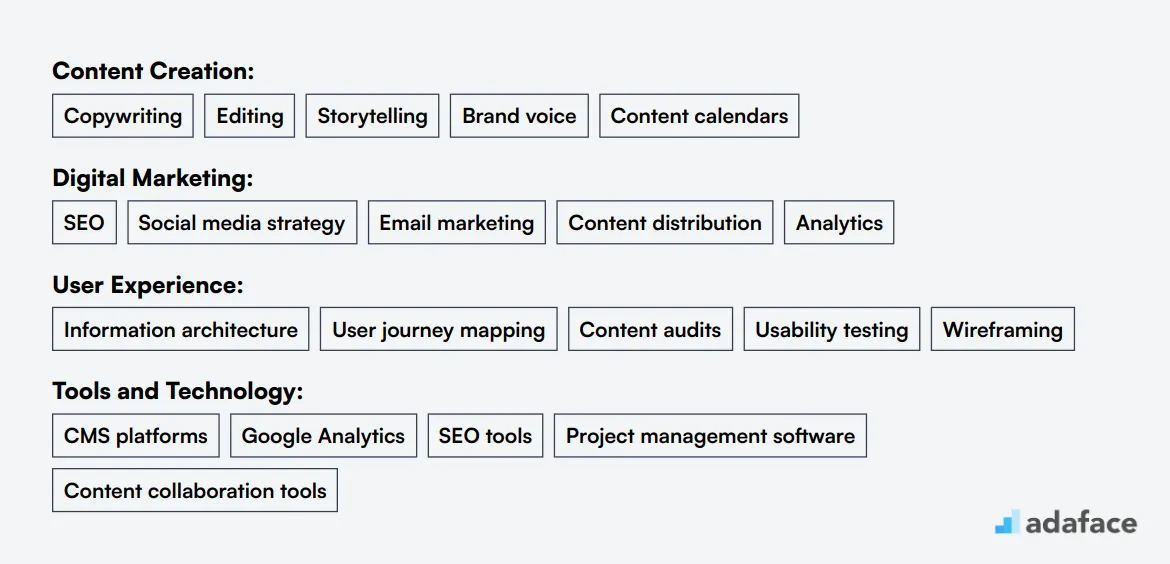
To effectively screen resumes, you should be familiar with key terms related to the role. Look for keywords such as "content strategy," "SEO," and "CMS experience." Prioritize resumes that also highlight skills in "content creation" and "strategic thinking," which are critical components of this role.
AI Language Models can streamline the screening process by scanning resumes for these keywords. Tools like ChatGPT can assist in identifying resumes that match your criteria, saving you time and ensuring no qualified candidate slips through the cracks.
INPUT: Resumes
OUTPUT: For each resume, provide following information:
- Email id
- Name
- Matching keywords
- Score (out of 10 based on keywords matched)
- Recommendation (detailed recommendation of whether to shortlist this candidate or not)
- Shortlist (Yes, No, or Maybe)
RULES:
- If you are unsure about a candidate's fit, put the candidate as Maybe instead of No
- Keep recommendation crisp and to the point.
KEYWORDS DATA:
- Content Strategy (SEO, CMS, Analytics)
- Content Creation (Copywriting, Editing, Brand voice)
- Tools and Technology (Google Analytics, SEO tools, Content collaboration tools)
Recommended skills tests for assessing Content Strategists
Skills tests are an effective way to evaluate Content Strategists beyond their resumes. They provide objective insights into a candidate's abilities and expertise. Here are five key tests we recommend for assessing Content Strategists:
Content Strategy Test: This Content Strategy Test evaluates a candidate's ability to develop and implement content strategies. It assesses skills in content planning, audience analysis, and measuring content performance.
SEO Assessment Test: An SEO Assessment Test is valuable for Content Strategists who need to optimize content for search engines. It measures understanding of SEO principles, keyword research, and on-page optimization techniques.
Digital Marketing Test: Content strategy often aligns with broader marketing goals. A Digital Marketing Test can assess a candidate's knowledge of various digital channels and how content fits into overall marketing strategies.
Data Analysis Test: Content Strategists should be able to interpret data to inform their decisions. A Data Analysis Test can evaluate their ability to analyze content performance metrics and draw actionable insights.
Communication Test: Strong communication skills are essential for Content Strategists. A Communication Test can assess a candidate's ability to convey ideas clearly and effectively across various formats and channels.
Case Study Assignments to Hire Content Strategists
Case study assignments offer a practical approach to assess the real-world skills of a Content Strategist. However, they can be lengthy and often result in lower candidate participation, posing a risk of losing promising talent. Despite these challenges, well-crafted assignments provide valuable insights into a candidate's ability to strategize, create, and articulate content effectively.
Content Audit Assignment: This assignment involves evaluating an existing piece of content or a website section. It tests the candidate's ability to identify gaps, suggest improvements, and align content with organizational goals. Content audits help you understand the candidate's analytical skills and strategic mindset. Learn more about a content strategist's job description to grasp the role expectations.
Campaign Strategy Proposal: In this assignment, candidates are asked to develop a content strategy for a hypothetical campaign. This task evaluates their thinking process, creativity, and ability to align content with target audiences. A well-structured campaign proposal highlights the candidate’s understanding of brand voice and market trends.
Content Calendar Development: Candidates create a month-long content calendar incorporating themes, channels, and timelines. This assignment assesses their planning skills and understanding of content pacing and scheduling. A well-crafted calendar reflects the candidate's capability to manage and execute content plans efficiently.
How to Structure Interview Stage for Hiring Content Strategists
After candidates pass the skills tests, the next step is the technical interview stage where their hard skills are assessed. Skills tests help filter out unfit candidates, but interviews allow you to identify the best candidate suited for the role. This stage is crucial for understanding the candidate's ability to develop effective content strategies and align them with business goals.
Here are some sample questions to consider when interviewing content strategists: 1. How do you develop a content strategy from scratch? This question assesses their strategic thinking abilities. 2. Can you discuss a time when you adapted content strategy to a change in business goals? This checks their adaptability and problem-solving skills. 3. What tools do you prefer for analyzing content performance and why? This reveals their familiarity with industry tools, such as tools used in SEO. 4. How do you ensure content consistency across channels? This looks at their ability to maintain brand voice. 5. Describe a successful content campaign you led. What was your role? This question gives insight into their previous experiences and success metrics.
What is the cost of hiring a Content Strategist?
Hiring a Content Strategist can range significantly based on factors like experience and location. In the United States, the average salary is approximately $84,268, while in Australia, it’s around AUD 88,824. By understanding these salary benchmarks, you can create competitive offers that attract top talent.
Content Strategist Salary in the United States
The average salary for a Content Strategist in the United States is approximately $84,268. Salaries vary by location, with the highest reported salaries in San Francisco, CA, where it can reach up to $156,545, while in places like Los Angeles, CA, it may start around $30,102. Understanding these figures can help you set competitive salary ranges to attract the right talent.
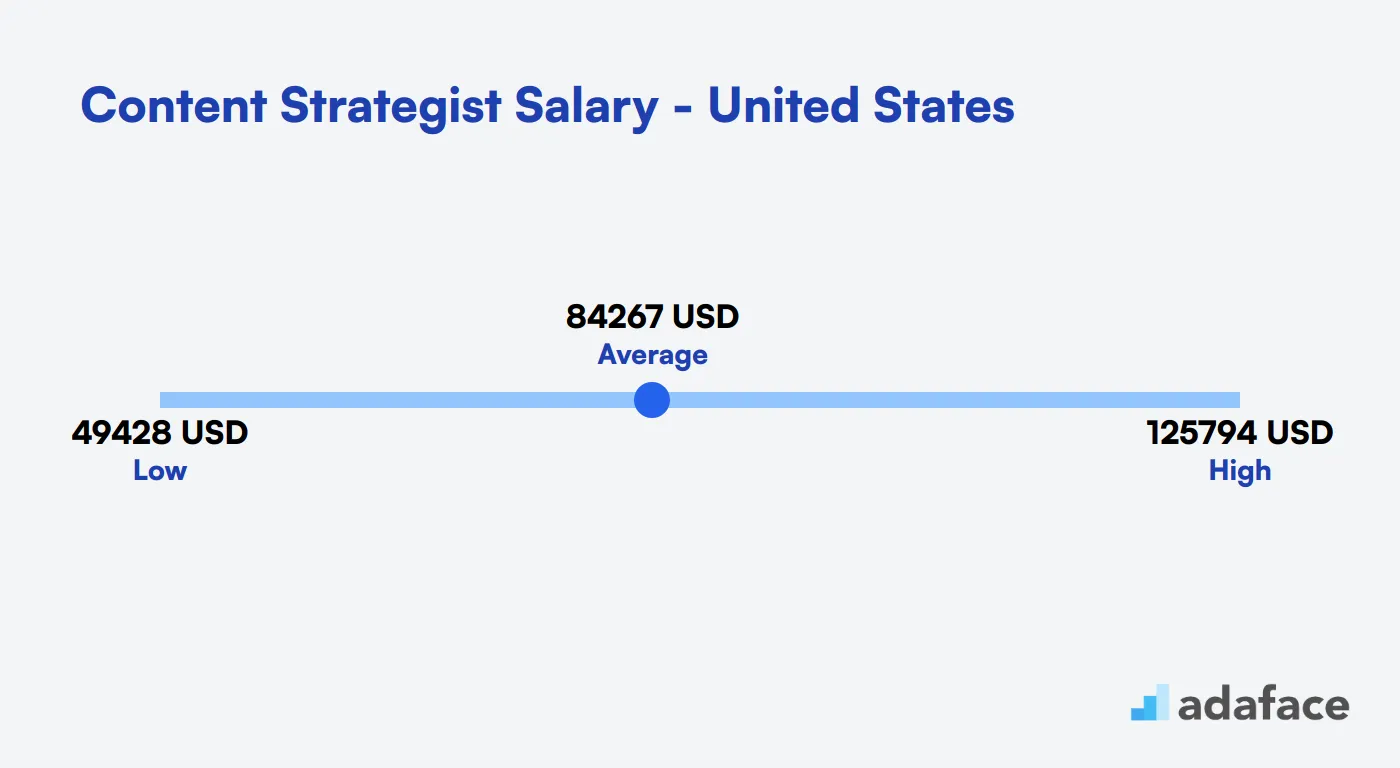
Content Strategist Salary in the United Kingdom
Content Strategists in the UK can expect competitive salaries. According to recent data, the average annual salary for Content Strategists ranges from £35,000 to £65,000. However, this can vary based on experience, location, and company size.
In London, salaries tend to be higher, with some senior roles offering up to £90,000 per year. Entry-level positions typically start around £25,000 to £30,000 annually. As with many roles in digital marketing, freelance and contract positions may offer higher day rates but less job security.
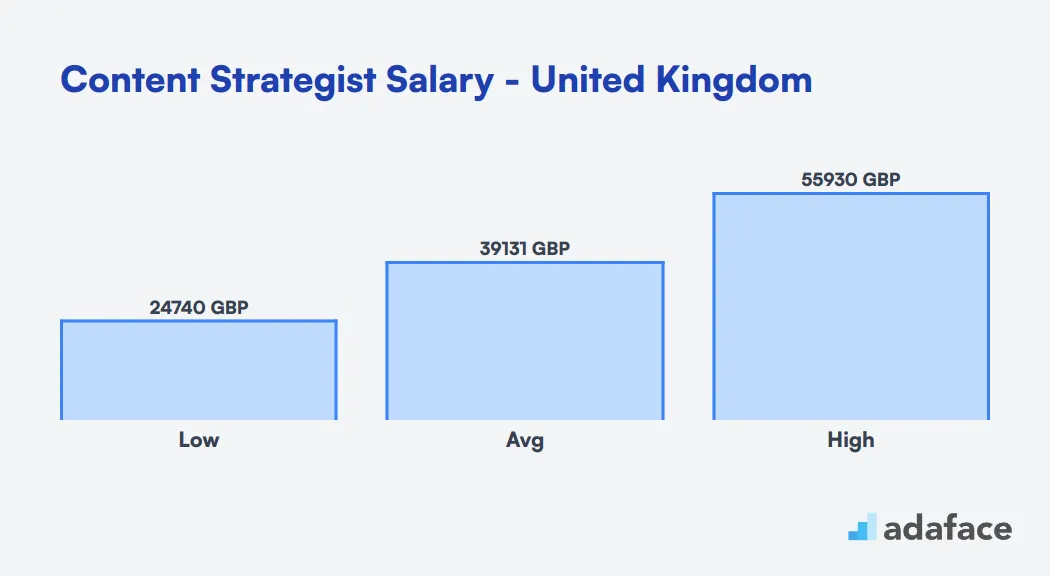
Content Strategist Salary Australia
In Australia, the average salary for a Content Strategist is approximately AUD 88,824 per year. Salaries can range from around AUD 59,440 at the entry-level to about AUD 122,563 for more experienced roles. In Sydney, the salary tends to be higher, with an average of AUD 124,444. This reflects the demand and cost of living in different regions.
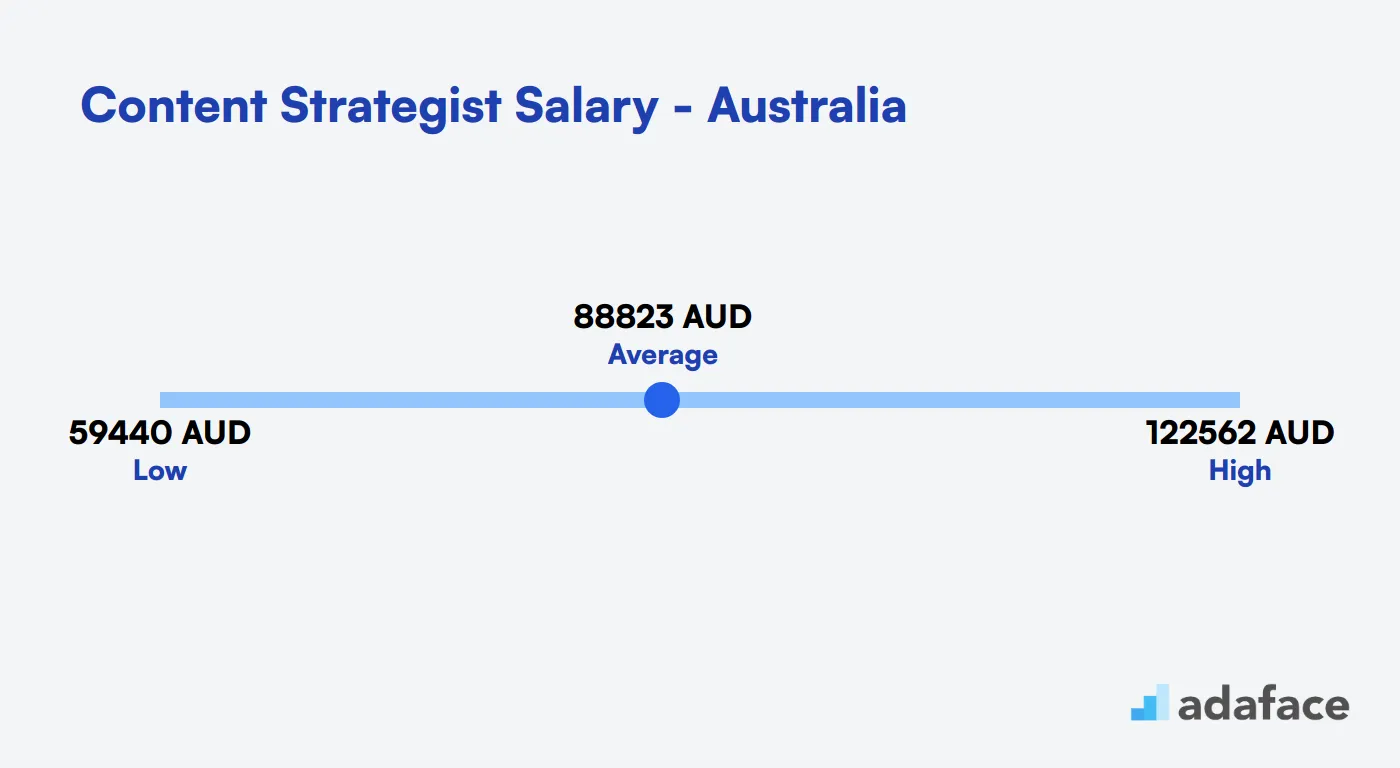
What's the difference between a Content Strategist and a Content Marketing Manager?
Many people often confuse the roles of a Content Strategist and a Content Marketing Manager, as both positions deal with content. However, their responsibilities and focus areas differ significantly, leading to different skill sets and deliverables.
A Content Strategist concentrates on the overall content strategy and planning, taking a broad, company-wide approach. They conduct extensive data analysis and research, ensuring a long-term vision for content that spans 3-5 years. Deliverables include content audits and style guides, and they collaborate across various departments.
In contrast, a Content Marketing Manager focuses on content creation and distribution primarily within marketing channels. Their work is more campaign-driven, with metrics that emphasize lead generation and conversion rates. They typically engage in quarterly to yearly planning, producing deliverables such as editorial calendars and social media content.
| Content Strategist | Content Marketing Manager | |
|---|---|---|
| Focus | Overall content strategy and planning | Content creation and distribution |
| Scope | Broad, company-wide content approach | Specific marketing campaigns and channels |
| Analytical Skills | Advanced data analysis and research | Basic analytics and reporting |
| Technical Knowledge | SEO, UX, information architecture | Social media, email marketing, CMS |
| Deliverables | Content audits, style guides, content models | Editorial calendars, blog posts, social media content |
| Collaboration | Works across departments | Primarily within marketing team |
| Long-term Planning | 3-5 year content vision | Quarterly to yearly planning |
| Metrics Focus | User engagement, content effectiveness | Lead generation, conversion rates |
What are the ranks of Content Strategists?
The role of a Content Strategist can often be confused with other marketing positions due to overlapping responsibilities. Understanding the hierarchy within this role can help clarify expectations and define the scope of work for each level.
• Junior Content Strategist: This is an entry-level position where individuals assist in the development and execution of content strategies. They often work under the guidance of more experienced strategists and may focus on specific tasks like research and analytics.
• Content Strategist: At this level, professionals are expected to create, implement, and manage comprehensive content strategies. They have a deeper understanding of the audience and market trends, allowing them to drive effective content initiatives.
• Senior Content Strategist: Senior strategists possess extensive experience and take on a leadership role within the content team. They oversee complex projects, mentor junior staff, and are responsible for aligning content strategies with broader business objectives.
• Head of Content: This is a top-level position that oversees all content-related functions within an organization. The Head of Content sets the vision for the content strategy and ensures that all content aligns with the company’s goals and brand message.
Hire the Best Content Strategists
In this guide, we've explored the various aspects of hiring a Content Strategist, from understanding their roles and responsibilities to crafting an effective job description and navigating the hiring process. We also covered essential skills and qualifications, screening strategies, and the differences between a Content Strategist and a Content Marketing Manager.
If there's one key takeaway, it's to use precise job descriptions and skill assessments to enhance your hiring accuracy. Utilizing targeted skills tests, such as the Content Strategy Test, can provide deep insights into a candidate's capabilities, ensuring you find the right fit for your team.
Content Strategy Test
FAQs
A content strategist is responsible for planning, developing, and managing content strategies that align with business objectives. They conduct content audits, develop content calendars, and analyze the effectiveness of content initiatives.
Look for candidates with strong analytical skills, creativity, strategic thinking, and experience in content management systems. Knowledge of SEO, UX/UI design, and data analysis is also valuable.
Focus on candidates' past experiences in content strategy roles, their ability to align content with business goals, and familiarity with content management tools. Consider leveraging our content strategy assessment test.
Some of the top platforms include LinkedIn, Indeed, Glassdoor, and specialized job boards like ProBlogger and Content Marketing Association. Each platform offers access to a diverse pool of candidates.
Begin with a phone or video screening to assess communication skills, followed by technical rounds focused on real-world scenarios. Consider incorporating a case study assignment to evaluate the candidate's problem-solving abilities.
A content strategist focuses on overarching content plans and strategies, aligning them with business goals. A content marketing manager, on the other hand, is responsible for executing those strategies through various marketing channels.
While many content strategists hold degrees in marketing, communications, or related fields, practical experience in content strategy, SEO, and data analysis often outweighs formal education.

40 min skill tests.
No trick questions.
Accurate shortlisting.
We make it easy for you to find the best candidates in your pipeline with a 40 min skills test.
Try for freeRelated posts
Free resources



